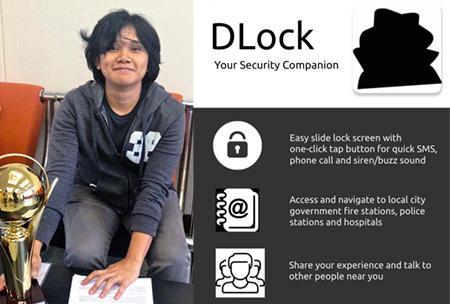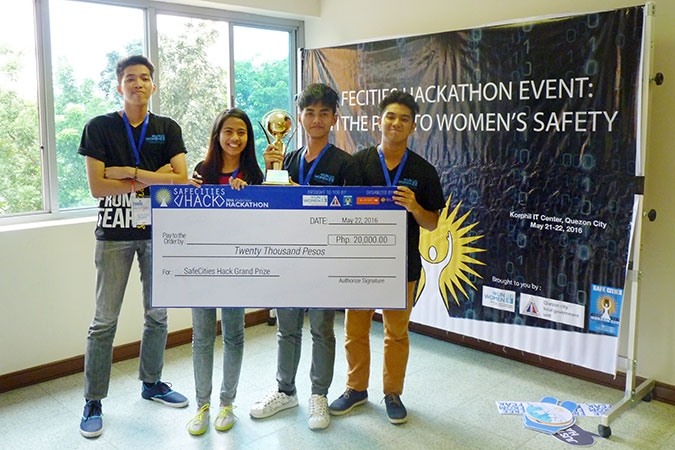Hacking to combat sexual harassment in Philippines
In Quezon City, three out of five women experience sexual harassment in public spaces. For girls aged 18 – 24, the prevalence is even higher. As part of UN Women’s Safe Cities Global Flagship Programme Initiative, the Metro Manila Programme held the first-ever hackathon in May 2016, to seek mobile technology solutions to sexual harassment and violence against women and girls in public spaces.Date:
Quezon City, Philippines – The sun is setting over Quezon City, Philippines and a 13-year-old girl walks quickly towards the bus station, looking over her shoulders as she goes, worried the boys that hang out around the station will try to corner her again. She opens her phone safety app, ready to press the alert button if needed. The app will notify other app users nearby and activate a distress call for help. It could save her that day.

In this sprawling city, street harassment and sexual violence against women and girls are rampant in public spaces. Three out of five women report having experienced various forms of sexual harassment such as catcalling, stalking and groping in public transportation. For girls aged 18-24, the prevalence is as high as 88 per cent. Quezon City, the biggest of 16 cities in Metro Manila, joined the UN Women Safe Cities Global Flagship Programme Initiative in 2014 to combat sexual harassment and violence, with funding from the Spanish Agency for Development Cooperation (AECID). This year in May, as part of the “Safe Cities and Safe Public Spaces” initiative, the Metro Manila Programme held the first-ever hackathon—a computer programming challenge—in Quezon City to seek mobile technology solutions to sexual harassment and violence against women and girls in public spaces. In partnership with the Quezon City Local Government, UN Women brought together 56 seasoned and emerging hackers in Metro Manila to “use their powers for good” in a 24-hour hacking session at the Korea Philippines IT Training.
The Safe Cities Hackathon challenged tech experts to develop mobile safety apps f to improve reporting and combat street harassment and sexual violence of women and girls in public spaces; find innovative ways to use data; develop offline functions for when the internet is not available; and to create a new stand-alone app for women’s safety in emergency situations.
“I'm really happy that I joined the hackathon and I got a chance to be part of this movement to help make our cities safer for women,” says Clau Yagyagan, 24, who won the “#SafeCitiesHackathon: Tech the Path to Women’s Safety” Professional Category prize with her app “DLock.” The app features an easy-to-use lock screen with one-click buttons to send a message and make a phone call to an emergency contact. It also has a list of city directories to contact police stations, fire stations and hospitals in a specific city.
The app has a reporting feature that allows a user to post messages and connect with other users of the app who are within a set radius, and request help if needed.
For the “Students” category, the Lester’s Pips team of hackers won with their ScAFE app, which is able to show the user where the safe points are in an area, such as the nearest and most crowded places based on the user’s location. The user can also send a message to the nearest patrol area or alert family members and friends if she is experiencing harassment.

All the winners at the hackathon will present their inventions to Quezon City Mayor Herbert Bautista later this month.
The Safe Cities Metro Manila Programme is working to address the lack of security that women feel as they move about in the city—using public transport, lining up in terminals, going to the markets, and even while walking in their own neighbourhoods. “We are committed to work with UN Women to explore how we can use mobile apps to advance women’s safety in our city,” said Quezon City Administrator Aldrin Cuña.
“This is what’s next,” says UN Women Safe Cities National Project Officer, Katherine Belen. “We want to go beyond training and public awareness, and develop new solutions offered by information and mobile technologies for women’s safety. The applications are so multi-faceted: these mobile apps, for example, can be used to improve city planning, integrate women’s safety issues in advocacy for infrastructure investment, aid in local governance, and increase citizen participation through real time incident reporting.”
For more information:
Please contact: Katherine Belen
Project Officer, UN Women Philippines
Email: [ Click to reveal ]
To learn more about the hackathon, please check out the official event websites: http://safecitieshack.8layeracademy.com and Safe Cities Metro Manila Program Facebook Page.